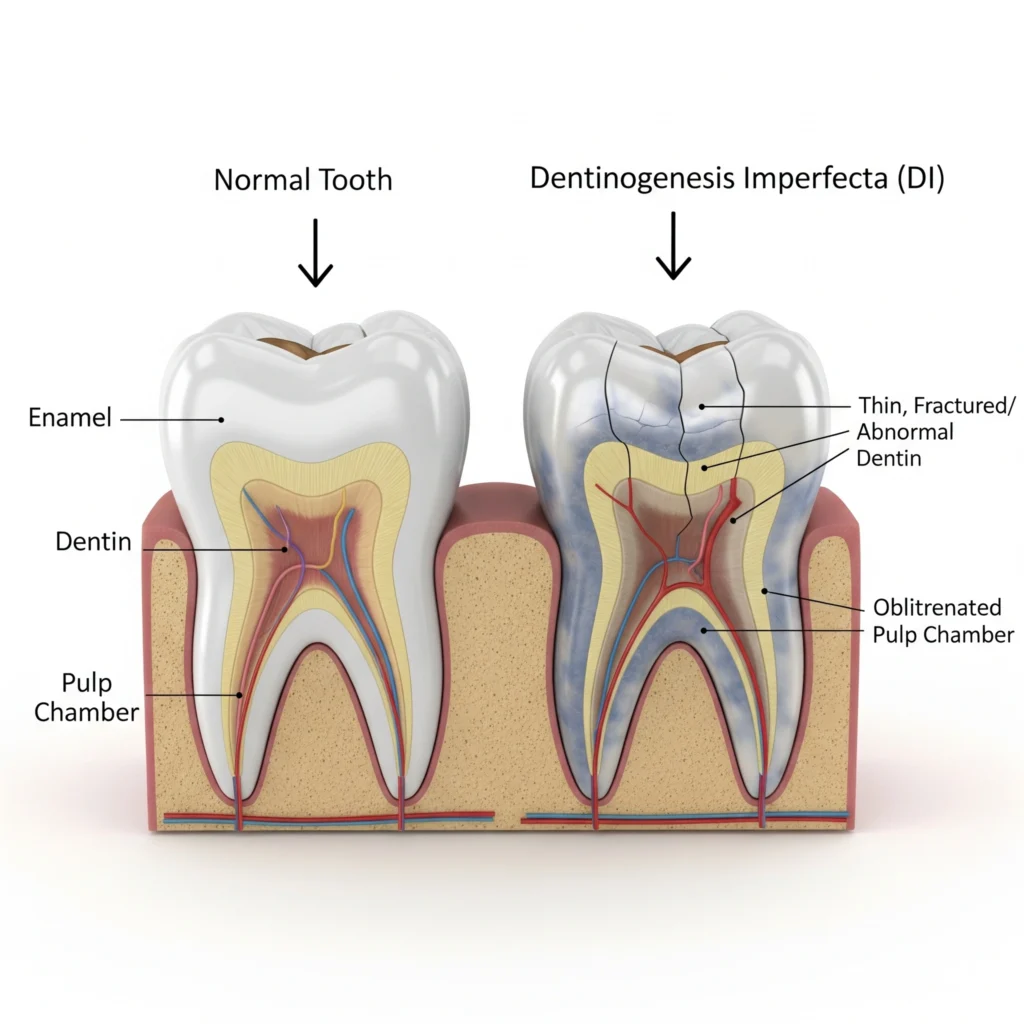Dentinogenesis Imperfecta is a rare genetic condition that weakens the structure and appearance of teeth. As one of the more noticeable hereditary dental disorders, it often leads to discolored, fragile teeth and can affect both primary and permanent dentitions. While the condition cannot be reversed, modern dentistry offers a range of effective treatment options that restore both function and aesthetics.
Let’s explore the top treatment strategies available today, and how early diagnosis can significantly improve outcomes especially for children showing signs of tooth discoloration and genetic tooth enamel problems.
Dentinogenesis Imperfecta is primarily caused by mutations in the DSPP gene, which plays a critical role in forming dentin the tissue beneath the tooth enamel. This condition is classified under genetic tooth enamel problems, although the primary defect lies within the dentin.
Symptoms may vary depending on severity but typically include:
These symptoms often lead to emotional and functional challenges, especially during childhood, when hereditary dental disorders become more evident.

Detecting Dentinogenesis Imperfecta early allows dentists to plan preventive and restorative care. Diagnosis typically includes:
Because this disorder shares visual traits with other genetic tooth enamel problems, professional evaluation is essential for proper treatment planning.
Effective management of Dentinogenesis Imperfecta is highly personalized. While there’s no cure, the following treatments help improve functionality and aesthetics:
1. Dental Crowns for Tooth Protection
One of the most common approaches involves full-coverage crowns that shield teeth from further damage. These crowns also restore shape, strength, and appearance especially in children with significant tooth discoloration and enamel breakdown.
Transitioning to crowns early can prevent the need for extractions later in life.
2. Composite Bonding for Aesthetic Enhancement
In mild cases, composite resin can be used to reshape and recolor affected teeth. While less durable than crowns, this technique is minimally invasive and effective in managing genetic tooth enamel problems in young children.
This approach improves smiles while maintaining most of the natural tooth structure.
3. Overdentures and Dental Implants
In severe cases where teeth are beyond repair, overdentures or dental implants may be necessary. These prosthetic solutions offer long-term stability and a natural appearance. Implants, in particular, are recommended once jaw growth is complete often in late adolescence or adulthood.
Though more invasive, this treatment ensures functional restoration in extreme cases of Dentinogenesis Imperfecta.
4. Orthodontic Treatment for Bite Correction
Due to abnormal tooth development, patients often suffer from malocclusion (misaligned bite). Orthodontic solutions like braces or aligners can be introduced after restorative work, allowing better jaw alignment and improved oral hygiene.
Correcting the bite not only boosts appearance but also preserves dental health in the long term.
Tooth discoloration in children is often the first noticeable sign of Dentinogenesis Imperfecta. While cosmetic correction is crucial, the underlying structural damage must be addressed simultaneously.
Pediatric dentists typically use:
Addressing both the aesthetic and functional aspects leads to better emotional well-being for children with hereditary dental disorders.
Ongoing care is key to managing Dentinogenesis Imperfecta. The goal is to minimize deterioration and reduce the need for complex procedures in the future.
Dentists recommend:
Parental involvement is critical, especially when children are too young to understand the importance of routine dental visits.
While Dentinogenesis Imperfecta poses challenges, modern dentistry offers reliable treatments to manage symptoms, protect teeth, and restore confidence. With timely intervention and continued dental support, children and adults can enjoy healthy, functional smiles.
If you or your child are showing signs of hereditary dental disorders, don’t wait. Book a consultation with the experts at Unidental—where compassionate care meets cutting-edge dental solutions.
No. Since it is a genetic condition, it cannot be prevented. However, early detection and treatment significantly reduce long-term complications.
Yes. Both primary and permanent teeth are usually affected. Early intervention during childhood can help manage symptoms effectively.
Not necessarily. With proper care, restorations, and monitoring, many patients retain their natural teeth well into adulthood.
Standard whitening procedures are usually ineffective due to the internal dentin defect. Cosmetic solutions like crowns or veneers are more appropriate.
Without treatment, patients may experience frequent fractures, infections, and functional impairments. Proper dental care can help avoid these issues.
Hyderabad : +91 6305 971445
Anantapur: +91 70758 90089
Goa: +91 83266 32500
Mon to Sat 10:00AM to 8:00PM
Sun 10:00AM to 12:00PM

Our goal is to provide friendly, caring dentistry with the highest standards in general, cosmetic, and specialist treatments. We strive to be the best dental hospital for comprehensive oral care.
We use advanced dental technology to deliver safe, precise, and painless treatments for every patient.